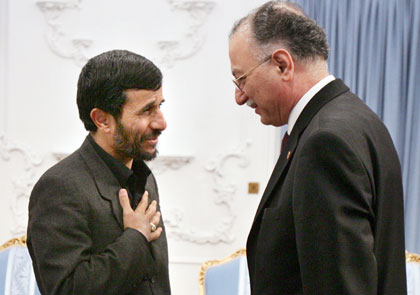|
Iran: Talk breakthrough still possible
(AP)
Updated: 2006-06-03 22:09
TEHRAN, Iran - Iran said Saturday that a breakthrough in negotiations over
its contentious nuclear program was possible and welcomed unconditional talks
with all parties, including the United States.
Iran's state-run
television said President Mahmoud Ahmadinejad told U.N. Secretary General Kofi
Annan that a settlement over the Islamic republic's nuclear program was
possible, provided the International Atomic Energy Agency - the U.N.'s nuclear
watchdog - preserved Tehran's minimum right to atomic energy.

Iranian President
Mahmoud Ahmadinejad (L) greets Chief of the Organisation of the Islamic
Conference (OIC) Ekmeleddin Ihsanoglu in Tehran June 2, 2006.
[Reuters] |
"A breakthrough to overcome world
problems, including Iran's nuclear case, would be the equal implementation of
the law for all," the television quoted Ahmadinejad as telling Annan during a
telephone conversation. Ahmadinejad's comment alluded to the fact that Iran is a
signatory of the IAEA treaty that allows member states to pursue civilian
nuclear activities.
Earlier Saturday, Foreign Minister Manouchehr
Mottaki said Iran was open to a negotiated solution for its nuclear program.
"We think that if there is good will, a breakthrough to get out of a
situation they (the European Union and United States) have created for
themselves... is possible," Mottaki told a press conference.
Six world
powers agreed on Thursday to offer Iran a new package of incentives if it gives
up uranium enrichment, or sanctions if it refuses. The plan could either defuse
a global confrontation with the Islamic regime or hasten one.
The United
States warned Iran on Friday that it would not have much time to respond to the
international package of rewards, suggesting that the window could close and be
replaced by penalties if the Islamic republic doesn't react fast.
"We
are waiting to officially receive the proposals. We will make our views known
after studying the package," Mottaki said.
"We will also mention if any
part of the package is not in Iran's interests," he said.
Mottaki said
European Union foreign policy chief Javier Solana would hand deliver the package
to Iranian officials in the next few days. No specific date has yet been set for
the trip, he said.
In Belgium, Solana's spokeswoman Cristina Gallach
confirmed he was ready to travel to Iran very soon. "The trip is not going to be
a negotiating trip, the objective is to present the proposals of the
international community," she said.
At an Asian security conference,
U.S. Defense Secretary Donald H. Rumsfeld said that Washington was still hoping
for a positive Iranian response to the new incentives package.
"The
information has just been communicated to them, and it seems to me the
appropriate thing now to do is to wait and see which path the Iranian government
will take," Rumsfeld said.
Rumsfeld said he hoped Iran would "recognize
the seriousness and substance" of what had been put forward.
Iran's
foreign minister said Tehran would study the package "within the necessary
timeframe."
In a rare show of optimism, Mottaki stressed that a
settlement could be reached on the nuclear issue.
"We think that the
views we will present our partners could prepare the ground for a comprehensive
understanding (between Iran and the West)," he said, referring to the EU nations
as partners in a sign that Iran is willing to find a solution to the nuclear
standoff.
The package, agreed upon Thursday by the five permanent
members of the U.N. Security Council and Germany, carries the threat of U.N.
sanctions if Tehran remains defiant over its nuclear program which the West
fears is a cover for producing nuclear weapons. Iran says it is only striving to
use nuclear reactors for generating electricity.
A short statement
issued Thursday night did not mention economic sanctions, but U.S. officials
said privately that Iran could face tough Security Council sanctions if it
refuses to give up uranium enrichment and other disputed nuclear activities.
The formal offer of talks is expected to be made by France, Britain and
Germany, the three EU nations that previously negotiated with Tehran.
A
senior U.S. state department official said he expected Tehran would be invited
to begin new negotiations "within a matter of days."
The United States,
in a major policy shift, agreed this week to join those talks on the condition
that Tehran suspends all uranium enrichment and related activities. It would be
the first major public negotiations between the two countries in more than 25
years.
Mottaki insisted Saturday that Iran would join no talks if
conditions were attached.
"These negotiations have to be without any
conditions. We won't accept any condition for talks," he told reporters.
"Member states of the board of governors at the IAEA can be parties for
talks," added Mottaki. The U.S. is on the board of governors of the IAEA.
Mottaki said Iran had its own views on how to conduct the talks. He did
not elaborate, saying Tehran would make its position known once the talks
develop.
Iran announced April 11 that it had enriched uranium for the
first time, using 164 centrifuges. Enrichment can produce either fuel for a
nuclear reactor or material for a warhead - but tens of thousands of
centrifuges are needed to do either on a large scale.
Iran intends to
move toward large-scale uranium enrichment involving 3,000 centrifuges by late
2006, and then expand the program to 54,000 centrifuges.
Iran maintains
that as a signatory to the Nuclear Nonproliferation Treaty it has the right to
enrich uranium for peaceful purposes - such as the production of reactor fuel.
However, Iran has indicated that it may suspend large-scale uranium
enrichment to ease tensions.
|
| |
|
| |
|
|
|
| Most Commented/Read Stories in 48 Hours |
|
|
|
|